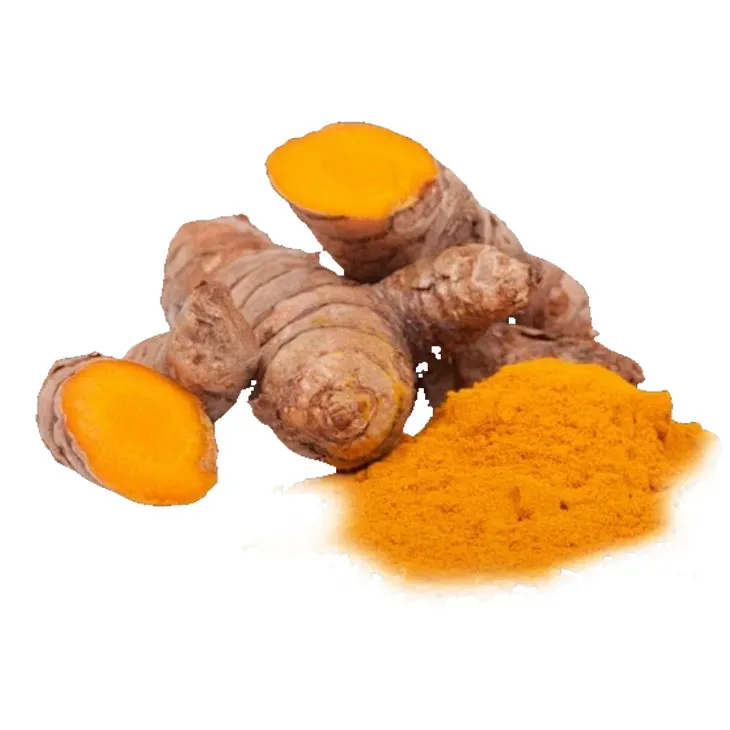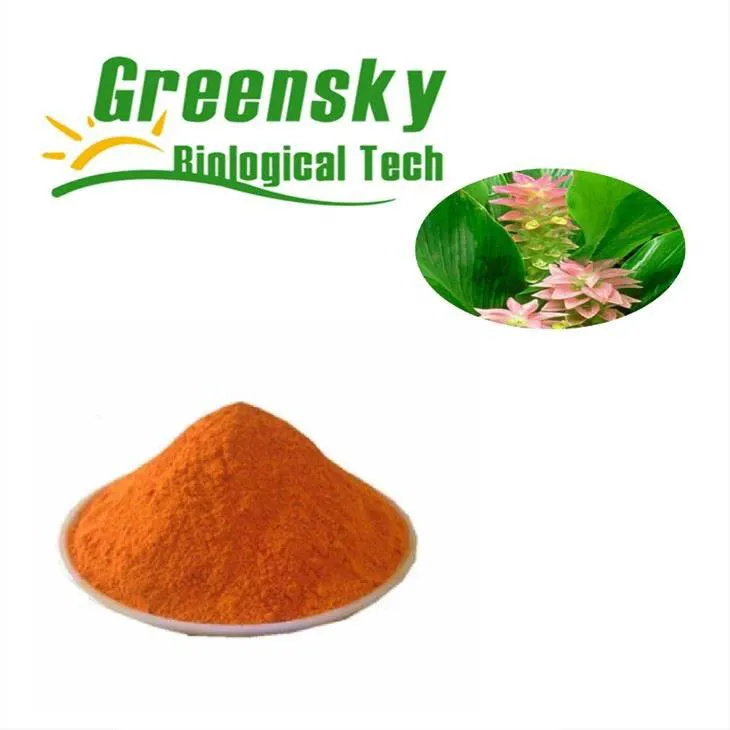- 0086-571-85302990
- sales@greenskybio.com
Natural Ingredient in Anti - aging Skin Care Products - Curcumin.
2024-11-12

1. Introduction to Anti - aging Skincare
The field of anti - aging skincare has witnessed a remarkable growth in recent years. People are becoming more conscious of their skin's health and appearance as they age. This has led to a surge in the demand for effective anti - aging products. The market is flooded with a plethora of options, ranging from creams and serums to more invasive procedures. However, there is a growing preference for natural ingredients in these products, as they are perceived to be safer and more gentle on the skin.

2. Curcumin: A Promising Natural Ingredient
Curcumin, sourced from turmeric, has emerged as a highly promising natural ingredient in the realm of anti - aging skincare. Turmeric has been used for centuries in traditional medicine for its various health - promoting properties. Curcumin, being the active component of turmeric, has now caught the attention of the skincare industry.

3. The Antioxidant Role of Curcumin
3.1 Free Radicals and Skin Aging In our day - to - day lives, our skin is constantly exposed to environmental factors that can accelerate the aging process. Sunlight, pollution, and smoking are some of the major culprits. These factors generate free radicals, which are highly reactive molecules. Free radicals have the ability to oxidize skin cells. This oxidative stress can lead to a breakdown of collagen and elastin fibers in the skin, which are crucial for maintaining skin's firmness and elasticity. As a result, the skin becomes wrinkled, dull, and loses its youthful appearance.
3.2 How Curcumin Fights Free Radicals Curcumin is a powerful antioxidant. It has the ability to neutralize free radicals before they can cause damage to the skin cells. By donating electrons to these free radicals, curcumin stabilizes them and prevents them from oxidizing the skin cells. This antioxidant activity of curcumin helps in maintaining the integrity of the skin cells and reduces the signs of aging. For example, studies have shown that regular use of curcumin - containing skincare products can lead to a reduction in the appearance of fine lines and wrinkles.

4. Anti - Inflammatory Functions of Curcumin
4.1 Skin Inflammation and Aging Skin inflammation can play a significant role in the aging process. There are various causes of skin inflammation. UV - induced damage is one of the most common causes. When the skin is exposed to ultraviolet (UV) radiation from the sun, it can trigger an inflammatory response. This can lead to redness, swelling, and damage to the skin cells. Microbial infections can also cause skin inflammation. Bacteria, fungi, or viruses can infect the skin and initiate an inflammatory reaction. Additionally, autoimmune reactions in which the body's immune system mistakenly attacks its own skin cells can also result in inflammation.
4.2 Curcumin's Anti - inflammatory Action Curcumin exhibits excellent anti - inflammatory properties. It can inhibit the production of inflammatory mediators in the skin. These mediators are chemicals that are released during an inflammatory response and are responsible for the redness, swelling, and pain associated with inflammation. By reducing the production of these mediators, curcumin helps to soothe the skin and reduce inflammation. This, in turn, can slow down the aging process as chronic inflammation can accelerate the breakdown of collagen and elastin in the skin.

5. Curcumin and Skin Rejuvenation
5.1 Importance of Skin Hydration and Barrier Function Maintaining proper skin hydration and a strong skin barrier function is essential for healthy - looking skin. Hyaluronic acid and ceramides are two key components that play crucial roles in these aspects. Hyaluronic acid is a natural moisturizing factor that can hold a large amount of water, keeping the skin hydrated and plump. Ceramides, on the other hand, are lipids that form a protective barrier on the skin, preventing water loss and protecting the skin from external irritants.
5.2 How Curcumin Promotes Skin Rejuvenation Curcumin can interact with skin cells to promote the production of hyaluronic acid and ceramides. It can stimulate the cells to synthesize these important substances, thereby enhancing the skin's hydration and barrier function. This results in a more youthful and radiant appearance of the skin. For instance, when curcumin is applied topically, it can penetrate the skin layers and activate the cellular mechanisms involved in the production of these components.

6. Challenges in Incorporating Curcumin into Skincare Products
6.1 Chemical Stability of Curcumin One of the main challenges in using curcumin in anti - aging skincare products is its chemical stability. Curcumin is relatively unstable under certain conditions. It can degrade easily when exposed to light, heat, or oxygen. This degradation can reduce its effectiveness as an anti - aging ingredient. For example, if a curcumin - containing cream is stored in a warm and sunny place, the curcumin may break down over time, and the product may not deliver the expected anti - aging benefits.
6.2 Bioavailability of Curcumin Another issue is the bioavailability of curcumin. Bioavailability refers to the proportion of a substance that is able to enter the bloodstream and reach the target cells in the skin. Curcumin has low bioavailability, which means that only a small amount of it may actually be absorbed by the skin when applied topically. This can limit its anti - aging effects as a significant amount of the curcumin may not be able to reach the cells where it is needed to exert its antioxidant, anti - inflammatory, and rejuvenating functions.
7. Strategies to Optimize Curcumin in Skincare
7.1 Formulation Improvements To overcome the challenges related to curcumin's chemical stability, skincare product manufacturers can focus on improving the formulation. For example, they can use encapsulation techniques. Encapsulating curcumin can protect it from environmental factors such as light and oxygen. This can help to maintain its stability during storage and use. Additionally, using appropriate solvents and additives can also enhance the stability of curcumin in the product.
7.2 Enhancing Bioavailability There are several ways to enhance the bioavailability of curcumin. One approach is to combine curcumin with other substances that can improve its absorption. For example, certain oils or surfactants can help to increase the penetration of curcumin into the skin. Another strategy is to use nano - technology. Nano - particles of curcumin can have better penetration and absorption properties compared to regular curcumin, allowing more of it to reach the target cells in the skin.
8. Conclusion
Curcumin is a natural ingredient with great potential in anti - aging skincare. Its antioxidant, anti - inflammatory, and skin rejuvenation properties make it an attractive option for those seeking natural alternatives in skincare. However, the challenges related to its chemical stability and bioavailability need to be addressed. With the development of appropriate strategies such as formulation improvements and enhancing bioavailability, curcumin can be fully harnessed to provide effective anti - aging benefits in skincare products.
FAQ:
What is curcumin?
Curcumin is a natural ingredient sourced from turmeric. It has multiple beneficial properties for the skin in the context of anti - aging.
How does curcumin act as an antioxidant in anti - aging skin care?
Environmental factors like sunlight, pollution, and smoking produce free radicals which oxidize skin cells and lead to aging. Curcumin can fight against these free radicals, thus preventing oxidative damage to the skin.
Why is curcumin's anti - inflammatory function important for anti - aging?
Skin inflammation can accelerate the aging process and can be caused by UV - induced damage, microbial infections or autoimmune reactions. By reducing inflammation, curcumin helps slow down the aging process.
How does curcumin contribute to skin rejuvenation?
Curcumin can interact with skin cells to promote the production of important components such as hyaluronic acid and ceramides which are crucial for maintaining skin hydration and barrier function.
What are the difficulties in incorporating curcumin into anti - aging skincare products?
Its chemical stability and bioavailability need to be optimized to ensure that it can fully exert its anti - aging effects in the skin.
Related literature
- The Role of Curcumin in Skin Health and Disease"
- "Antioxidant and Anti - Inflammatory Properties of Curcumin for Skin Aging"
- "Curcumin: A Promising Ingredient for Skin Rejuvenation in Anti - aging Products"
- ▶ Hesperidin
- ▶ citrus bioflavonoids
- ▶ plant extract
- ▶ lycopene
- ▶ Diosmin
- ▶ Grape seed extract
- ▶ Sea buckthorn Juice Powder
- ▶ Beetroot powder
- ▶ Hops Extract
- ▶ Artichoke Extract
- ▶ Reishi mushroom extract
- ▶ Astaxanthin
- ▶ Green Tea Extract
- ▶ Curcumin Extract
- ▶ Horse Chestnut Extract
- ▶ Other Problems
- ▶ Boswellia Serrata Extract
- ▶ Resveratrol Extract
- ▶ Marigold Extract
- ▶ Grape Leaf Extract
- ▶ blog3
-
Cranberry Plants and Skin - care Products.
2024-11-12
-
Kidney Bean Extract
2024-11-12
-
Artichoke Leaf Extract
2024-11-12
-
Yohimbine Bark Extract
2024-11-12
-
Troxerutin
2024-11-12
-
Yellow Pine Extract
2024-11-12
-
Lavender Extract
2024-11-12
-
Milk Thistle Extract
2024-11-12
-
Andrographis Paniculata Extract Powder
2024-11-12
-
Aguaje Extract
2024-11-12
-
Centella Asiatica Extract
2024-11-12





















